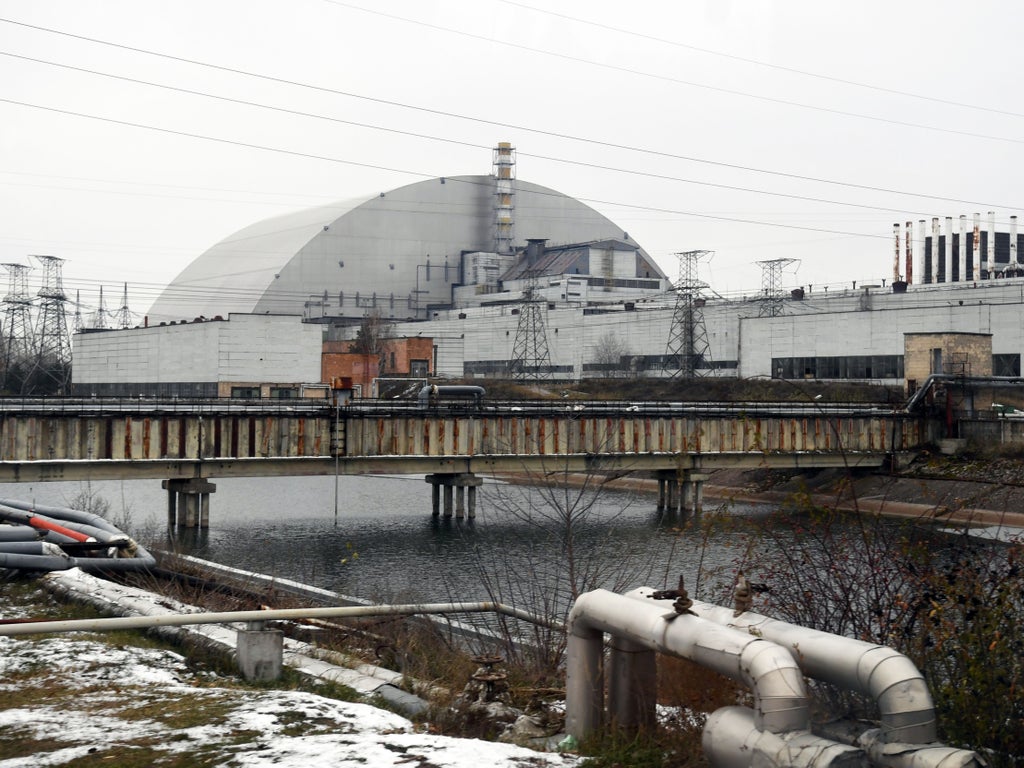
Scientists have warned there are “several areas of concern” after the decommissioned Chernobyl nuclear plant in Ukraine was knocked off the power grid.
Authorities said the outage could put systems for cooling nuclear material at risk. The cause of the damage to the power line serving Chernobyl was not immediately clear. The plant, the site of the world’s worst nuclear disaster, is currently under the control of Russian troops.
According to Ukraine’s national nuclear regulator, all Chernobyl facilities are without power and the diesel generators have fuel for 48 hours. Without power, the “parameters of nuclear and radiation safety” cannot be controlled.
The International Atomic Energy Agency (IAEA) said there was “no critical impact on safety” following the power loss, while scientists believe there is no risk of a large release of radioactivity, on the scale of the 1986 accident.
The plant has been shut down since 2000, and the spent fuel rods stored on the site have been cooling for decades. “Therefore they will not be producing significant amounts of heat, making a release of radiation very unlikely,” said Professor Geraldine Thomas, director of the Chernobyl Tissue Bank.
However, warnings have still been raised over the health of workers on the site and the risk of nuclear waste leaking into the immediate local area surrounding Chernobyl.
Professor Claire Corkhill, a chair in nuclear material degradation at the University of Sheffield, said: “There are several areas of concern with regards to the safety of the nuclear material stored there.”
“Spent nuclear fuel, originating from reactors one and three, is stored in a cooling pond,” she added. “This material produces heat through radioactive decay and requires constant cooling, which is achieved by pumping fresh cool water into the ponds.
“With no power supply, this water could slowly evaporate, potentially resulting in contamination of the building by low levels of radioactive isotopes.
“Another serious concern is the maintenance of the ventilation system in the New Safe Confinement structure. This prevents further degradation of reactor number four and the hazardous exposed nuclear fuel within, and is essential to the future decommissioning of the site.
“If there is no power to this structure, we could see the complete failure of the €1.5bn decommissioning programme to make the site safe once and for all.”
The IAEA, the United Nations’ nuclear watchdog, said the loss of electricity violates a “key safety pillar on ensuring uninterrupted power supply”. But it tweeted that “in this case IAEA sees no critical impact on safety”.
“Heat load of spent fuel storage pool and volume of cooling water at Chernobyl Nuclear Power Plant sufficient for effective heat removal without need for electrical supply,” the IAEA added.
Dr Mark Wenman, a reader in nuclear materials at Imperial College London, explained that the site’s fuel storage ponds are “very deep and would likely take weeks for the water to boil down even without cooling pumps active”.
He added: “This should hopefully allow enough time for the power to cooling systems to be restored.”
But Energoatom, Ukraine’s state-run nuclear company, said there were about 20,000 spent fuel assemblies at Chernobyl that could not be kept cool during a power outage, and that their warming could lead to the release of radioactive substances into the environment.
The radioactive cloud could be carried by wind to other regions of Ukraine, Belarus, Russia, and Europe, it said in a statement.
However, Prof Thomas argued otherwise: “In the unlikely event of a release of any radiation, this would be only to the immediate local area, and therefore not pose any threat to western Europe – there would be no radioactive cloud.”
Dr Wenman said: “Fire is another risk to the plant in general but this is less concerning as the worst radioactivity is in the fuel, which is protected by being underwater.”
Ukraine has appealed to Russia for a temporary ceasefire to allow repairs to be made to a power line to the Chernobyl. Energoatom said fighting between Ukrainian and Russian forces made it impossible to immediately repair the high-voltage power line to the plant.







